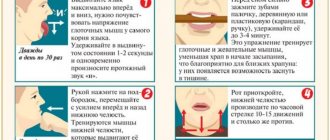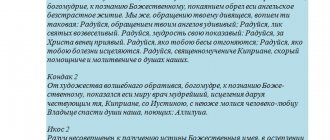Thoughts
Chilling and disturbing thoughts have many differences: the pretext, or the attack of a thought, has no sin, but it is the temptation of our autocracy, what does it bow to - either to them, or to resistance to them, and when there is a combination and combination with these passions, it is considered a sin and is subject to repentance. Not being able to resist them ourselves, we must resort to God, cast aside our weakness and ask for His help, and ask the Mother of God for help with them. When someone is overcome by thoughts, this is a sign that pride has preceded them, and therefore one must be more humble through them (St. Macarius).
Don’t you understand how it is: “it’s up to us to win and be conquered”? How else? the excuse of some nasty thought comes; it is your will to accept it or reject it; when you combine with him and come together, you are already captivated and defeated, and when you reject the pretext, you win... (Venerable Macarius).
Resist the first mental attack, crush the Babylonian babies while they are still babies - with prayer and humility, and when they grow up, they will become giants and it is difficult to resist them (St. Macarius).
About your thoughts, Saint David writes in the book of psalms: “The message of the Lord is that the thoughts of men are vanity” (Ps. 93:11). And therefore, do not blame them for sin, which I personally told you about, but you are used to worrying in vain (Venerable Anthony).
In considering your frequent conversation with your thoughts, you should also not be embarrassed or become despondent, for such thoughts, it seems to me, are nothing more than a sleepy dream. Some people only rave at night in deep sleep, but you and I, sinners, often rave in reality... There is only one cure for this: “Lord Jesus Christ, Son of God, have mercy on me, a sinner, and by the power of Your cross, protect my thoughts from vain and soul-harming thoughts!” .” (Venerable Anthony).
That gloomy thoughts often bother you, do not be embarrassed, for gloomy thoughts, like autumn clouds, one after another find and darken the light, but they pass, and the sky remains clear and pleasant. So our thoughts will wander, wander around the world, and the mind will settle in its place, then it will be quiet and joyful in the soul. And our minds from wandering here (here) and ovamo (there) are greatly aided by the short but often repeated Jesus Prayer, to which, Lord, grant you to acquire the skill, and then clear days will come for you (Venerable Anthony).
In your last letter you describe the bitter and proud thought of eternal torment, and the enemy imagined that you are wiser and more just than God in your judgments! See where he took you - above the clouds! Such thoughts do not happen with the humble, but you suffer for your exaltation and for your overthinking, for you are accustomed to talking to yourself and think to argue with your thoughts, but they are reflected by the Jesus Prayer and silence in your thoughts. What to do, every person is given his own cross, which he must bear without complaint, for even these worthless thoughts should serve as a lesson for our humility, and not arrogance, for without God, in our own strength, we cannot cope with flies (Venerable Anthony) .
...Anxious thoughts are the worst of all, which should always be feared (Venerable Anthony).
And when you feel different thoughts and distractions in your home prayer, and sometimes even in church prayer, this happens sometimes involuntarily, and sometimes voluntarily. For example, in Moscow and St. Petersburg, peddlers with various small items almost continuously pass by the windows and shout: “Buy, buy! I sell it very cheap.” In order not to pass them by and not to shout, this is not in our will, but to stop them and enter into a conversation with them and to examine the little things they are passing around, this is in our will, and we are not without a loss when we buy something from them. The same should be understood about thoughts. So that they do not come, it is not in our will, but to talk to them is in ours, that is, if we delight in unclean imagination, from which may the Lord save you! (Venerable Anthony).
Regarding your thoughts, you need to be more careful and cry out with tears - Lord, before I even completely perish, save me (Venerable Joseph).
Protecting your soul from thoughts is a difficult matter, the meaning of which is not even clear to worldly people. They often say: why protect the soul from thoughts? Well, the thought came and went, so why fight it? They are very wrong. Thoughts don't just come and go. Another thought can destroy a person’s soul, another thought makes a person completely turn around on the path of life and go in a completely different direction than he was going before. The Holy Fathers say that thoughts are from God, thoughts from oneself, that is, from one’s nature, and thoughts from demons. In order to discern where thoughts come from, whether they are inspired by God, or by a hostile force, or come from nature, great wisdom is required (St. Barsanuphius).
Question: “These days I had absolutely no time to read, a wide variety of thoughts did not allow me to concentrate, and this even made me lose the desire to read.” Answer: “You go out onto the terrace, sit, the peaceful view will induce a prayerful feeling on you. One has only to look at our church... It is not in your power to drive away thoughts, but not to accept them is within yours. The name of Jesus drives them away. And sometimes a thought is deliberately allowed to bother you; you must endure the thoughts, without, however, agreeing with them...” (Venerable Barsanuphius).
And if thoughts are scattered during prayer, then this is an ordinary thing - beginners cannot help but be scattered. As for your confusion from thoughts, there is only one remedy: patience and humility (Venerable Anatoly).
And that thoughts are clouded, and grumbling, and cowardice, then this is the usual fruit of an incorrect and weak life. But the hour will come, and now it is, when those who were dead (that is, by the spirit) will hear the voice of the Son of God, and having heard they will live, that is, by the Holy Spirit (Rev. Anatoly).
And so as not to annoy you with thoughts that, they say, tomorrow and the day after tomorrow you will endure the same things: this is a common thing of the devil. But what the devil predicts will come true, but what God commands. If I was carried away by thoughts in church, may God forgive me. Just try to collect your thoughts. This is a monastic matter (Venerable Anatoly).
...You despair and are so afraid to reveal your weaknesses to me that fear has set in and your chest has tightened. I myself am a sinful man, but I believe in the Lord, Who said: “I have come to save sinners” (cf. Luke 5:32). And I am a sinner, therefore, the Lord will save me. It’s scary who sins and does not repent. And you and I, as much as we can, try to repent. Therefore, do not be discouraged. Thoughts struggle with many people, but they do not dare touch the humble. But we do not have humility, so we suffer dishonor. You still cannot reflect these thoughts, but run quickly to Jesus, that is, say the Jesus Prayer (Venerable Anatoly).
What thoughts and in what order are brought by enemies, firstly, insults and insults, in order to shake the foundation of prayer. Thoughts about earthly glory and earthly prosperity under the guise of virtue and even something spiritual; their basis is pride (venerable Nikon).
Agreement with the thoughts of sin is communication with the enemy, hence the retreat of God’s power and help from us (Venerable Nikon).
To your question, what thoughts should you confess? Only those who struggle with the soul, and you don’t need to worry much about others, otherwise they will become more cold (Venerable Hilarion).
You write, you are sad about being separated from me, and languid thoughts find that you may soon lose me. — There is no need to be sad and think ahead, let’s use the present and thank God (Rev. Hilarion).
In thoughts of self-praise, we must look at our sins and remember that without God’s help we will not do anything good or useful, our only weaknesses and sins. - Bear sorrow from the abbess without grumbling and pray for those who insult you - it will not be difficult (Venerable Hilarion).
... You received some peace upon arrival from us, which, envying, the malicious enemy armed itself against you and confuses you with various thoughts, presenting supposedly blessed reasons, trying with them to shake the foundation on which you, with the help of God, wanted to build the building of virtue and please the Lord. The second reason is that you, wanting to please God, want to quickly ascend to the heights of virtues and think this is possible from you, which clearly proves your spiritual pride (of which you are aware of yourself), that, without finding the active fruits of good, which you could boast, the rarest desire for good serves as food for it (pride). This reason provides a convenient opportunity for the enemy to launch a strong attack on you by God’s permission. Here are the two main reasons for your confusion and anxiety... (Venerable Leo).
...No matter how many waves arise on your soul, always resort to Christ. Savior, He will come to the rescue and tame the waves. You believe that the Lord has carefully arranged for you such a life for healing, do not reject it and do not seek bodily tranquility and imaginary peace, first you must be shaken and endure a lot: if you have a revelation, then it will greatly ease your struggle and you will have more peace of mind than by itself (Venerable Lev).
O.A. Fever driven thoughts of going home can be excused, but one should not agree to them. If he had looked at the other world more often, he would have had better thoughts. If he is not calm, one must respond to the elder, without whose blessing one should not accept or do anything (Venerable Moses).
Our invisible enemy himself will put a sinful thought into a person’s soul, and immediately write it down as his own, in order to subsequently accuse the person at the Last Judgment of God (St. Ambrose).
The Lord will deliver you from all undue thoughts, just humble yourself (Venerable Ambrose).
When the day comes that you seem to be living well - cheerfully and calmly, and suddenly you become restless and your thoughts confuse you, then say to yourself: why are you embarrassed now? Do you remember when you were dead (Venerable Ambrose).
Against weak thoughts, pray to the Lord: “Cleanse me from my secrets” and so on, and you will receive relief... (Venerable Ambrose).
...You write...that you had a strong desire to die, and were not afraid of death, all this is the seduction of the enemy (Venerable Ambrose).
When you find vague thoughts, then pray: “May God rise again” and bow. - “To the Virgin Mary” three times and bow each time. - “It is worthy to eat” and bow (Venerable Ambrose).
... All this contradictory confusion is the action of an enemy who fights with both his gums and his back, now with melancholy and fear, now with arrogance and arrogance, and when his suggestions are rejected, he again whispers: “He has done good, he has done good, he has conquered, he has become great.” It seemed to you that you had truly arrived at the level of perfection, but you yourself write that your head is empty, your soul is like a plundered temple, that you have difficulty getting used to oral prayer, and you have never fulfilled the rosary rule, because as soon as you take it up, starts to break you down a lot. Where did your perfection come from? We see that there is an obvious contradiction here, which is first of all healed by sincere repentance and sincere confession “to whom it should be” (Rev. Ambrose).
In the future, be careful and circumspect when receiving suggestions of plausible thoughts from spiritual enemies. No matter how plausible these thoughts may be, if they bring confusion and despair, then they are wolves in sheep’s skins, says Barsanuphius the Great (Venerable Ambrose).
Chapter 6. TEACHING ABOUT THOUGHTS
From a practical point of view, it is important to understand not only the general situation with thoughts, but also the particulars, details, “specifics”. Each of us has a different ability to resist thoughts, is subject to various kinds of excuses and experiences specific difficulties.
When we are weak in resisting our thoughts, we must remember the instruction of St. Barsanuphia:
Only saints can drive away thoughts and resist them, but we need to flee from them... if you don’t have the strength to fight thoughts, then you will call on the Lord Jesus, and His name will drive thoughts away from us. They, as I have already said, cannot commit sin. For example, is it really your fault that when you opened the door of your cell, you were caught in the wind and covered in snow? There is no fault in this. But since you see that you are not able to walk through such a blizzard, then you can only escape by running, namely, by slamming the door. And the other one, stronger, he, like David, goes out to single combat, but not with bare hands. Notice what David came out against Goliath with - a stone. What does stone mean?
“The stone is Christ” (1 Cor. 10:4) [2, vol. 2, p. 75].
Only saints can fully fight thoughts. Sanctified by God, having extensive experience and skill in waging mental warfare, they, of course, can not allow the enemy into their consciousness. But for us, the weak, it is better to “flee for our lives.” Those. without relying on your own strength, begin to call on the Lord immediately when thoughts appear.
However, some options are possible here. If we are able to reflect an adjective, then we must reflect it as the elders teach - by ignoring it. However, if the excuse is intrusive and we feel unable to cope with it, then we can no longer hesitate. We need to start praying to the Lord for help.
This is what Rev. advises in such cases. Macarius:
You write that for several days various thoughts have been constantly struggling with you, which you find it difficult to explain. They especially confuse you during singing, reading and church services. There is nothing to be surprised at and there is no need to be embarrassed: thoughts creep into your mind against your desire, and you, due to your weakness, agree with them and are embarrassed. Prayer is a weapon against the devil; you arm yourself against him, and he resists you with his thoughts, but instead of being embarrassed, repent before God and humble yourself, no matter how many times you happen to get carried away by your thoughts. When you have a pledge of humility, the enemy cannot resist it. So, do not be embarrassed, but repent! God accepts the prayer of the humble
[2, vol. 2, p. 74].
There is no need to be surprised by thoughts or embarrassed by them - even when it seems that their appearance is especially inappropriate. Once we take up the weapon of prayer against the devil, then he also takes up his weapon of thoughts against us. This is spiritual warfare, not a walk in the Garden of Eden. And the enemy may be stronger than us, imposing a thought and not allowing us to get rid of it.
This is our weakness, which should not, however, lead us to confusion or despair. If we couldn’t help but get carried away by our thoughts, we became unclean, which is also our fault: we didn’t take care of the commandments we should have, didn’t engage in self-education - that’s why we gave a convenient attack to the enemy. But you can't be embarrassed. We must repent before God and humble ourselves. Only this will provide protection, for God loves the humble and does not leave them without help.
Humility may consist, in particular, in tolerating thoughts without agreeing with them. Rev. talks about this. Barsanuphius:
Question: “These days I had absolutely no time to read, a wide variety of thoughts did not allow me to concentrate, and this even made me lose the desire to read.”
.
Answer: “And you go out onto the terrace, sit, the peaceful view will induce a prayerful feeling on you. One has only to look at our church... It is not in your power to drive away thoughts, but not to accept them is within yours. The name of Jesus drives them away. And sometimes a thought is deliberately allowed to bother you; you have to endure the thoughts, without, however, agreeing with them...”
[2, vol. 2, p. 69].
The first thing you need to do when thoughts appear is to try to adjust yourself to a peaceful mood and not accept them. In other words, the presence of a thought in our mind should not lead to its consideration, much less to its “development.” If this presence bothers us, then we must remember that sometimes thoughts are allowed to bother us so that we may have humility. Humility in this case is necessary for a person in order to avoid even worse and dangerous thoughts.
The combination of prayer and patience with thoughts without agreeing with them is the most reliable way to get rid of thoughts. Rev. Ambrose instructs:
You ask: what is better, to grieve over thoughts or not to pay attention to them? Both are not of your measure, i.e. You should not grieve senselessly, and you cannot yet despise your thoughts, but you should humbly turn to God and pray. Only during prayer should one try to reject all thoughts and, without paying attention to them, continue the prayer; if the chill of thoughts intensifies, then again one should ask for God’s help against them
[2, vol. 2, p. 79 – 80].
This is probably the main line of our behavior in mental warfare. When turning to the Lord in prayer, concentrate your mind on His name and will, ask for help and try to reject thoughts; if the latter do not retreat and even become stronger, increase humility, remembering your sins, and again ask God for help, without abandoning the sure hope of His mercy. It is dangerous to deviate from this line and try to argue with thoughts. This is pride for which we are punished.
Rev. Anthony says:
In your last letter you describe the bitter and proud thought of eternal torment, and the enemy imagined that you are wiser and more just than God in your judgments! See where he took you - above the clouds! Such thoughts do not happen with the humble, but you suffer for your exaltation and for your overthinking, for you are accustomed to talking to yourself and think to argue with your thoughts, but they are reflected by the Jesus Prayer and silence in your thoughts. What to do, every person is given his own cross, which he must bear without complaint, for even these worthless thoughts should serve as a lesson for our humility, and not arrogance, for without God, in our own strength, we cannot cope with flies
[2, vol. 2, p. 68].
The habit of talking to oneself a lot and the hope of overcoming thoughts is born from exaltation and overthinking for unnecessary reasons. This is what the enemy needs in order to use our “logic” to “justify” his thoughts. This is how an unhumble person comes to the point of accepting the thought that he is destined for eternal torment, losing faith in the Savior and the path that He gave us. How absurd and bitter it is to put the arguments of your captive mind above what God says...
Bear your cross without complaint, reflect your thoughts with the Jesus Prayer and silence in your thoughts. Use the bad thoughts themselves to develop greater humility, to trust not in yourself, but in God. The only way.
Rev. Ambrose, in his instructions, shows in detail and accurately the correct line of behavior when dealing with the invasion of thoughts:
Consider the various suggestions of the enemy on a par with blasphemous thoughts and try to despise them, praying the psalm word:
“God, come to my help: Lord, seek my help.
Let those who seek my soul be ashamed and put to shame, let those who want (think) “to be evil” turn back and be ashamed (Ps. 69: 2 – 3). When the enemies inspire praise and proud exaltation, then continue the next verse, saying: “Let the abis return ashamed of those who say to me: good, good” (Ps. 69: 4). Also, in a decent manner and at a decent time, recite from the 39th Psalm, which begins like this: “I have endured the Lord, and have heard and heard my prayer” (Ps. 39:2) and so on according to the election to the end. Sometimes, against proud thoughts, pray, as one of the ancient fathers prayed, saying: “Lord, I am alien to all good and full of all evil: have mercy on me by Thy mercy alone.”
And repeat this many times, if possible, with earthly worship. The main thing is, try to maintain the faith and hope of salvation, that the Lord wants everyone to be saved and to come into the mind of truth. The weak enemy only tries to remove a person from the path of salvation with various absurd suggestions and intimidations, and possible temptations in order to somehow shake a person and turn him away from the true path, and although he sometimes, like a roaring lion, goes around looking for someone to devour, but the holy Apostle Peter exhorts us to resist him with firm faith and trust in the Lord, that He will not abandon us and is able to abolish and destroy all the machinations of the enemy, as we often hear in the troparion of the martyrs, who, having strength from the Lord, overthrew the tormentors and crushed the demons of weak insolence [2, vol. 2, p. 78 – 79].
In the varied suggestions of the enemy, it is important for them to contrast the words of Holy Scripture and Holy Tradition. The elder shows how prayer with the psalm word not only expresses a request for help, but also reveals the true meaning of what is happening during mental warfare. The enemy, with the help of thoughts, “searches for the soul of a person.” For this reason, he is ready to flatter us. Patience is absolutely necessary for us, for it comes from God.
Pride must be opposed to humility uncompromisingly, eliminating every clue for it, as one of the ancient fathers did: my soul is alien to all good and full of all evil, it is only by the mercy of God that it has mercy and lives... The most important thing is to maintain faith and the hope of salvation, protecting them from all sorts of absurd suggestions and intimidations, and possible temptations. With our firm faith and trust in the Lord, God will not abandon us. He is powerful to abolish and destroy all the machinations of the enemy. Therefore, you should never, even with the most powerful thoughts and temptations, even with darkness and captivity, lose heart and give up.
Rev. Macarius teaches:
When you happen to fall through the addition and captivity of thoughts into mental darkness and captivity, then, without becoming rigid, fall to the Lord with repentance, humility and contrition of heart, and do not give in to despair, which is still worse than passion itself. Look for guilt, where did this come from that you suffered so much? And the guilt is: pride, opinion about oneself, humiliation and condemnation of others, sweet eating, excessive rest, association with the opposite sex, and try to get away as much as possible from all of this, and even more so try to humble yourself, for, according to the word of the Holy Climacus: where there is a fall , tamo was preceded by pride (Degree 23). Do not become rigid in revelation, and this leads to humility, exposing yourself to others; Do you remember when you hid that you were hurt?
[2, vol. 2, p. 80].
No matter what we experience in our thoughts, no matter what passion captures us, no matter how gloomy and hopeless everything seems, there is still a way out until we give up and despair. Despair is bitterer than any passion, for it takes away the last and most important thing in us - the ability to fall to the Lord with repentance, humility and contrition of heart.
In the fight against despair, our weapon is awareness of our sins. If we do not sin against the truth, i.e. We won’t say that everyone except us is to blame for our suffering, but let’s say: our pride, opinion about ourselves, humiliation and condemnation of others, like other sins, have led us to a disastrous state - then the door to despair will be closed in the soul, and the door to repentance. And we must quickly enter the door of repentance, revealing what happened to others and exposing ourselves. This is how we gain healing humility.
In revelation (disclosure of thoughts and passions to others) one should not go into detail, for this is tantamount to considering thoughts out loud. Rev. Joseph advises:
One should not understand passionate and sinful thoughts, but use the spiritual sword against them. I’m telling you and V., but thinking about passionate thoughts and analyzing them only strengthens them. May the Lord protect everyone from addiction. You need to confess your thoughts with heartfelt contrition, with awareness of your sinfulness, with repentance, and you also need to listen to confession with prayer, then there will be no harm. And there is no need for unnecessary conversations or detailed explanations
[2, vol. 2, p. 82].
It is enough in confession, without further ado, to point out the general nature of thoughts (blasphemous, lustful, etc.) and the degree of their influence (combination, adjunction, passion), if it is understandable. There is no need to “paint” – this is an advertisement for demonism, which is harmful. The main thing is sincerity and half-heartedness of repentance and the desire to get rid of thoughts and passions.
In this sense, Rev. speaks out. A lion:
...Passionate waves and [storms] overwhelm your soul through thoughts and dream dreams, and in them you find yourself guilty of negligence, laziness and other things. It is fair that you give guilt, but in all these attempts of yours, always bring repentance to God with a contrite heart and constant self-reproach, and God will not allow the enemy to dominate your heart, only you yourself, as much as possible, resist passionate thoughts, do not allow them to reach your heart, but resort to God through prayer and awareness of your weakness. [It’s good] not to have any conversations about passionate matters, except for the revelation of your [spiritual] mother, which would be very useful for you, but I see that because of them you will stiffen in front of her with shame, and this is a form of pride
[2, vol. 2, p. 81].
An example of how the situation with thoughts was not fully understood by the elder’s ward. From the very presence of thoughts and dreams, guilt of negligence, laziness, etc. was correctly inferred. But, probably, there was no timely repentance - which led to the persistence of thoughts. The necessary revelation of the spiritual mother’s thoughts was postponed out of shame, which revealed unconscious pride. Isn’t it true that such half-heartedness is often characteristic of us too?
We must also understand the origins of this half-heartedness. There is a struggle between two forces in the human soul, and the incompleteness of the repentant mood testifies to the intransigence of the enemy, his desire to cling to the human soul to the last opportunity. As well as the fact that we too are inconsistent, lose our vigilance and suffer damage. Rev. Barsanuphius puts it this way:
...Doubts, just like lustful thoughts and blasphemies, must be despised and ignored. Despise them - and the enemy the devil will not stand it, he will leave you, for he is proud and will not tolerate contempt. And if you enter into conversations with them, because all lustful thoughts, blasphemies and doubts are not yours, then he will throw you down, overwhelm you, and kill you. A believer who loves God cannot blaspheme, but nevertheless notices two threads in himself: he both loves and blasphemes. It is obvious that there is still some evil force that casts doubts. Notice that this is the seraphim mind. Therefore, it is not at all surprising that it can arouse, raise doubts, and what kind of doubts! Don't pay any attention to them. There were so many sincerely believing people who suffered greatly because they accepted these doubts, examined them, reasoned... Therefore, you must despise these doubts, blasphemies, and prodigal thoughts, then they will not harm you at all, especially if you open them to the elder mentor. But they should not be opened in detail, otherwise you may harm both yourself and the elder. Especially lustful thoughts should be covered up, covered with a canopy... this stinking pit, and not delved into it
[2, vol. 2, p. 85 – 86].
The enemy easily carries out his attack while we are confused in our confusion or fear of thoughts. However, if we know how to despise and ignore doubts, thoughts and blasphemies, then this is already a retaliatory blow to the enemy’s pride. The enemy is proud, and he is greatly hurt by our disregard for his excuses and contempt. That is why, seeing that there is no harm to us and being wounded himself, he abandons the attack.
Entering into conversations with the enemy, as the elders repeatedly said, is unwise. For the “topics” for such conversations are not ours, they are the enemy’s, and the enemy knows how to develop them to our destruction. Moreover, the sophisticated, once seraphim mind of the devil weaves networks that are impossible for the weak mind of man to untangle. Therefore, one must despise, reject without consideration all thoughts, and for the sake of greater security, reveal them to the elder mentor.
The elders gave advice on overcoming specific thoughts, which makes their teaching about thoughts very practical. Thoughts about one's own perfection are dangerous, because they lead to serious falls. Rev. Ambrose gives advice:
Contrast proud and arrogant thoughts of perfection with extreme humility before God and people, making it plain to yourself that you have not yet learned oral prayer and are not following the cell rule. Where did perfection suddenly come from?
[2, vol. 2, p. 78].
The thought of perfection is a direct product of pride and its sister, arrogance. Only extreme humility, in which we are able to see our fault even in the simplest thing, which we consider, for example, verbal prayer, is capable of neutralizing our internal self-exaltation.
Conceited thoughts are also close to the proud. Rev. Hilarion says:
Vanity thoughts need to be explained, that’s the only way to defeat them
[2, vol. 2, p. 78].
The remedy against vain thoughts is analysis and explanation of their essence. When we see that vanity demands light without a light source, fruit without a tree, etc., then the very absurdity of these demands stops the development of vanity in us. Further deeper: the one who passionately loves earthly glory has forgotten about the glory of God. It is from this point that one must evaluate one’s own attempts at vanity, and this is how it is defeated.
Rev. Hilarion also gives instructions regarding thoughts of self-praise:
In thoughts of self-praise, we must look at our sins and remember that without God’s help we will not do anything good or useful, our only weaknesses and sins. - Bear the sorrows of the abbess without grumbling and pray for those who insult you - it won’t be difficult
[2, vol. 2, p. 71].
The habit of mentally speaking about oneself in excellent terms arises from constant consideration of one’s virtues. No matter how small they are, if you see nothing but them, they begin to grow and grow in our eyes. In essence, the elders say simply: deeply understand and feel that without God’s help you really, without the slightest exaggeration, can do anything good (“we can’t even deal with flies”). And if you want to look at what you are really capable of without God’s help, then look at your sins. With thoughts of self-praise, such reasoning quickly sobers up.
All battles of thought are not easy, but some of them are the most difficult. Rev. Nikon notes:
The most severe battles of thought: fornication, despondency. We must humble ourselves. Humility attracts God's help. The corrupting effect of lustful thoughts from enjoying them - the grace of God recedes for a long time, which can be attracted again only by sincere repentance and abstinence from these thoughts
[2, vol. 2, p. 81].
You should be especially careful and attentive when dealing with prodigal thoughts and thoughts that plunge you into despondency. The grace of God retreats from us for a long time when we are carried away by thoughts that are especially vile in the eyes of God. The elder attributed to them prodigal thoughts. When they invade, sincere repentance and abstinence are necessary immediately.
In this case, the medicine was prescribed by Rev. Anatoly (Zertsalov):
Remedies for lustful thoughts: humility, self-reproach, abstinence, and most of all - love for your neighbors - for the weak, infirm, sick, sisters captive to passions
[2, vol. 2, p. 81].
Love as the totality of perfection heals all our shortcomings and shortcomings, eliminates all our sinful inclinations. Therefore, the elder seems to be saying: leave everything dark and sinful, enter into love, where there is everything that a person needs. For the evangelist said: he who abides in love abides in God. Will we still choose - to abide in God or perish in the devil?
Thoughts on prayer
Do not be surprised that during the service various thoughts come to you: when you take up arms against your enemies, that is, prayer, then they also arm themselves against you with stronger excuses of thoughts. Run to the Lord in prayer against them and do not be embarrassed: they will disappear, and when you are embarrassed, seeing that they do not leave you, then you arm them more against yourself, and when you stand humbly and cry out to God against them, you will calm down... ( Rev. Macarius).
You write that for several days various thoughts have been constantly struggling with you, which you find it difficult to explain. They especially confuse you during singing, reading and church services. There is nothing to be surprised at and there is no need to be embarrassed: thoughts creep into your mind against your desire, and you, due to your weakness, agree with them and are embarrassed. Prayer is a weapon against the devil; you arm yourself against him, and he resists you with his thoughts, but instead of being embarrassed, repent before God and humble yourself, no matter how many times you happen to get carried away by your thoughts. When you have a pledge of humility, the enemy cannot resist it. So, do not be embarrassed, but repent! God accepts the prayer of the humble (St. Macarius).
When we stand in prayer, then the enemies take up arms against us, putting in different thoughts and imagining unlike dreams, trying to turn us away from prayer or plunge us into despondency. But we must have a good will to offer prayer and try to gather our wandering thoughts into the words of prayer, but when they invade, we must not be embarrassed, but, recognizing our weakness, repent before the Lord. Confusion over the invasion of thoughts shows our cowardice, which comes from pride; we want to see ourselves pure before God, following the example of the Pharisee, and not sinners, like the tax collector. That is why purity of prayer is not given to us, because we imagine something high about ourselves, and “what is high among men is an abomination to God” (Luke 16:15). Thus, it is better to humble yourself and repent in the face of our shortcomings, rather than to be embarrassed, and when correcting, not to be arrogant (Venerable Macarius).











